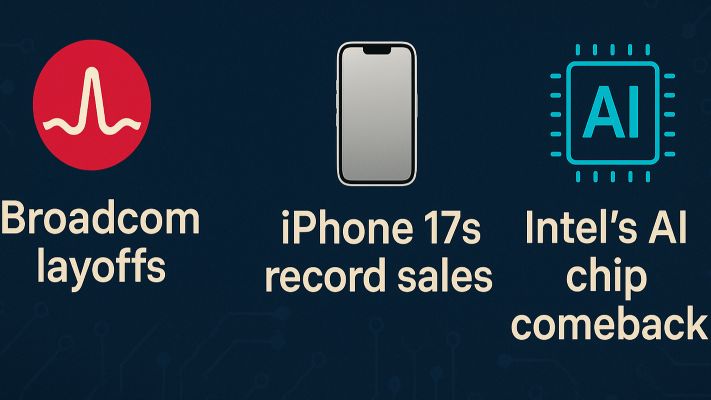AI Navigation
- articleAI Trends
- lightbulb_2AI Tips
- assistant_navigationAI Navigation
- heatHot Articles
- emergency_heat_2Hot Tips
- format_list_numberedPrompt Formatter
- psychologyTest Center(RPI)
2025 October 18 · 24-Hour AI Briefing: Broadcom layoffs, iPhone 17’s record sales, and Intel’s AI chip comeback
Over the past 24 hours, the AI industry spotlight has once again shifted toward compute power, supply chain realignment, and hardware strategy. From Broadcom’s workforce cuts to Apple’s iPhone 17 momentum and Intel’s long-awaited foundry win, each story reflects a single truth: the AI hardware race is far from over.

1. Broadcom launches major layoffs amid AI expansion
Broadcom has begun large-scale layoffs in its sales and account management divisions, affecting hundreds of employees. This is the company’s largest round of cuts since the $69 billion VMware acquisition in late 2023. VMware’s headcount has since been reduced by nearly half.
Commentary:
Broadcom’s AI revenue now makes up more than 50% of its total income, projected to grow 40% in FY2025. The layoffs target low-efficiency sales roles, saving hundreds of millions in operating costs. The company is reallocating resources toward AI chip R&D, EDA optimization, optical interconnects, and supply chain integration.
However, if the AI investment boom cools or shifts toward open hardware ecosystems, Broadcom could face growth constraints. For regular professionals, this is another reminder that AI doesn’t just create jobs—it reshapes them.
2. iPhone 17 activations surpass 4 million in China
Apple reported that iPhone 17 activations in China have exceeded 4 million units, with the Pro Max model alone surpassing 600,000 in a single week. Meanwhile, the ultra-thin iPhone Air has underperformed, prompting Apple to cut production.
Commentary:
Chinese consumers’ preference for high-end “big-screen flagships” continues to strengthen Apple’s presence in the premium market. Pro Max pre-orders surpassed iPhone 16 Pro Max’s first 24-hour total, driving an overall activation rate of 85%.
While performance in China is impressive, global activation represents just 12.5% of total shipments—below expectations. Still, for the iPhone 17 lineup, this marks a strong rebound. With new AI-driven imaging, personalization, and performance enhancements, Apple is gradually regaining user trust.
3. Intel 18A process secures major AI chip customer
Intel announced that its 18A process node has landed a “high-volume AI accelerator customer,” believed to be Microsoft, for production of custom Maia AI chips. Neither company has confirmed the deal publicly.
Commentary:
This represents a long-awaited win for Intel. The 18A process, featuring PowerVia backside power delivery, offers efficiency and density advantages over TSMC’s N2. Successful mass production could bring in billions in revenue and help rebuild market confidence.
Intel’s IDM 2.0 strategy is no longer theoretical—it’s a tangible step toward reclaiming relevance in the AI compute race.
For more cutting-edge AI developments, business insights, and tech trends, visit:
https://iaiseek.com/en
Want to catch up on what happened in the past 72 hours? Check out:
October 16, 2025 · 24-Hour AI Briefing: Australia’s $29B AI Cluster, Meta’s 1GW Data Center, Anthropic’s Budget Model, and Apple’s Talent Exodus
October 15, 2025 · 24-Hour AI Briefing: Microsoft, Alibaba Cloud, and Oracle Accelerate the Global AI Infrastructure Race